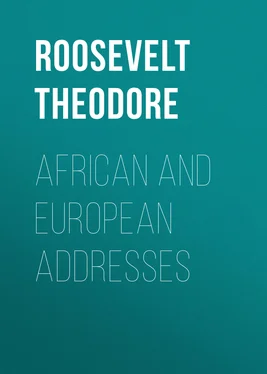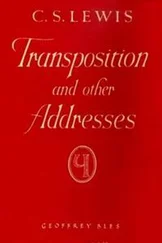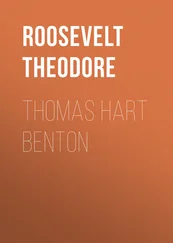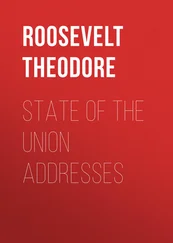Theodore Roosevelt - African and European Addresses
Здесь есть возможность читать онлайн «Theodore Roosevelt - African and European Addresses» — ознакомительный отрывок электронной книги совершенно бесплатно, а после прочтения отрывка купить полную версию. В некоторых случаях можно слушать аудио, скачать через торрент в формате fb2 и присутствует краткое содержание. Жанр: foreign_edu, Политика, на английском языке. Описание произведения, (предисловие) а так же отзывы посетителей доступны на портале библиотеки ЛибКат.
- Название:African and European Addresses
- Автор:
- Жанр:
- Год:неизвестен
- ISBN:нет данных
- Рейтинг книги:3 / 5. Голосов: 1
-
Избранное:Добавить в избранное
- Отзывы:
-
Ваша оценка:
- 60
- 1
- 2
- 3
- 4
- 5
African and European Addresses: краткое содержание, описание и аннотация
Предлагаем к чтению аннотацию, описание, краткое содержание или предисловие (зависит от того, что написал сам автор книги «African and European Addresses»). Если вы не нашли необходимую информацию о книге — напишите в комментариях, мы постараемся отыскать её.
African and European Addresses — читать онлайн ознакомительный отрывок
Ниже представлен текст книги, разбитый по страницам. Система сохранения места последней прочитанной страницы, позволяет с удобством читать онлайн бесплатно книгу «African and European Addresses», без необходимости каждый раз заново искать на чём Вы остановились. Поставьте закладку, и сможете в любой момент перейти на страницу, на которой закончили чтение.
Интервал:
Закладка:
You should be always on your guard against one defect in Western education. There has been altogether too great a tendency in the higher schools of learning in the West to train men merely for literary, professional, and official positions; altogether too great a tendency to act as if a literary education were the only real education. I am exceedingly glad that you have already started industrial and agricultural schools in Egypt. A literary education is simply one of many different kinds of education, and it is not wise that more than a small percentage of the people of any country should have an exclusively literary education. The average man must either supplement it by another education, or else as soon as he has left an institution of learning, even though he has benefited by it, he must at once begin to train himself to do work along totally different lines. His Highness the Khedive, in the midst of his activities touching many phases of Egyptian life, has shown conspicuous wisdom, great foresight, and keen understanding of the needs of the country in the way in which he has devoted himself to its agricultural betterment, in the interest which he has taken in the improvement of cattle, crops, etc. You need in this country, as is the case in every other country, a certain number of men whose education shall fit them for the life of scholarship, or to become teachers or public officials. But it is a very unhealthy thing for any country for more than a small proportion of the strongest and best minds of the country to turn into such channels. It is essential also to develop industrialism, to train people so that they can be cultivators of the soil in the largest sense on as successful a scale as the most successful lawyer or public man, to train them so that they shall be engineers, merchants—in short, men able to take the lead in all the various functions indispensable in a great modern civilized state. An honest, courageous, and far-sighted politician is a good thing in any country. But his usefulness will depend chiefly upon his being able to express the wishes of a population wherein the politician forms but a fragment of the leadership, where the business man and the landowner, the engineer and the man of technical knowledge, the men of a hundred different pursuits, represent the average type of leadership. No people has ever permanently amounted to anything if its only public leaders were clerks, politicians, and lawyers. The base, the foundation, of healthy life in any country, in any society, is necessarily composed of the men who do the actual productive work of the country, whether in tilling the soil, in the handicrafts, or in business; and it matters little whether they work with hands or head, although more and more we are growing to realize that it is a good thing to have the same man work with both head and hands. These men, in many different careers, do the work which is most important to the community's life; although, of course, it must be supplemented by the work of the other men whose education and activities are literary and scholastic, of the men who work in politics or law, or in literary and clerical positions.
Never forget that in any country the most important activities are the activities of the man who works with head or hands in the ordinary life of the community, whether he be handicraftsman, farmer, or business man—no matter what his occupation, so long as it is useful and no matter what his position, from the guiding intelligence at the top down all the way through, just as long as his work is good. I preach this to you here by the banks of the Nile, and it is the identical doctrine I preach no less earnestly by the banks of the Hudson, the Mississippi, and the Columbia.
Remember always that the securing of a substantial education, whether by the individual or by a people, is attained only by a process, not by an act. You can no more make a man really educated by giving him a certain curriculum of studies than you can make a people fit for self-government by giving it a paper constitution. The training of an individual so as to fit him to do good work in the world is a matter of years; just as the training of a nation to fit it successfully to fulfil the duties of self-government is a matter, not of a decade or two, but of generations. There are foolish empiricists who believe that the granting of a paper constitution, prefaced by some high-sounding declaration, of itself confers the power of self-government upon a people. This is never so. Nobody can "give" a people "self-government," any more than it is possible to "give" an individual "self-help." You know that the Arab proverb runs, "God helps those who help themselves." In the long run, the only permanent way by which an individual can be helped is to help him to help himself, and this is one of the things your University should inculcate. But it must be his own slow growth in character that is the final and determining factor in the problem. So it is with a people. In the two Americas we have seen certain commonwealths rise and prosper greatly. We have also seen other commonwealths start under identically the same conditions, with the same freedom and the same rights, the same guarantees, and yet have seen them fail miserably and lamentably, and sink into corruption and anarchy and tyranny, simply because the people for whom the constitution was made did not develop the qualities which alone would enable them to take advantage of it. With any people the essential quality to show is, not haste in grasping after a power which it is only too easy to misuse, but a slow, steady, resolute development of those substantial qualities, such as the love of justice, the love of fair play, the spirit of self-reliance, of moderation, which alone enable a people to govern themselves. In this long and even tedious but absolutely essential process, I believe your University will take an important part. When I was recently in the Sudan I heard a vernacular proverb, based on a text in the Koran, which is so apt that, although not an Arabic scholar, I shall attempt to repeat it in Arabic: " Allah ma el saberin, izza sabaru "—God is with the patient, if they know how to wait . 5 5 This bit of Arabic, admirably pronounced by Mr. Roosevelt, surprised and pleased the audience as much as his acquaintance with the life and works of Ibn Batutu surprised and pleased the sheiks at the Moslem University two days before. Both Mr. Roosevelt's use of the Arabic tongue and his application of the proverb were greeted with prolonged applause.—L.F.A.
One essential feature of this process must be a spirit which will condemn every form of lawless evil, every form of envy and hatred, and, above all, hatred based upon religion or race. All good men, all the men of every nation whose respect is worth having, have been inexpressibly shocked by the recent assassination of Boutros Pasha. It was an even greater calamity for Egypt than it was a wrong to the individual himself. The type of man which turns out an assassin is a type possessing all the qualities most alien to good citizenship; the type which produces poor soldiers in time of war and worse citizens in time of peace. Such a man stands on a pinnacle of evil infamy; and those who apologize for or condone his act, those who, by word or deed, directly or indirectly, encourage such an act in advance, or defend it afterwards, occupy the same bad eminence. It is of no consequence whether the assassin be a Moslem or a Christian or a man of no creed; whether the crime be committed in political strife or industrial warfare; whether it be an act hired by a rich man or performed by a poor man; whether it be committed under the pretence of preserving order or the pretence of obtaining liberty. It is equally abhorrent in the eyes of all decent men, and, in the long run, equally damaging to the very cause to which the assassin professes to be devoted.
Читать дальшеИнтервал:
Закладка:
Похожие книги на «African and European Addresses»
Представляем Вашему вниманию похожие книги на «African and European Addresses» списком для выбора. Мы отобрали схожую по названию и смыслу литературу в надежде предоставить читателям больше вариантов отыскать новые, интересные, ещё непрочитанные произведения.
Обсуждение, отзывы о книге «African and European Addresses» и просто собственные мнения читателей. Оставьте ваши комментарии, напишите, что Вы думаете о произведении, его смысле или главных героях. Укажите что конкретно понравилось, а что нет, и почему Вы так считаете.












